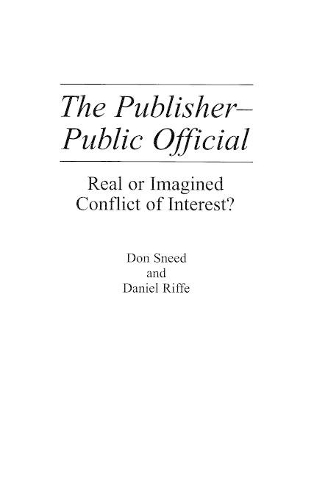
The Publisher-Public Official: Real or Imagined Conflict of Interest
(Hardback)
Publishing Details
The Publisher-Public Official: Real or Imagined Conflict of Interest
By (Author) Daniel Riffe
By (author) Don Sneed
Bloomsbury Publishing PLC
Praeger Publishers Inc
11th December 1991
United States
Classifications
Tertiary Education
Non Fiction
News media and journalism
070.4
Physical Properties
Hardback
144
Description
Social responsibility theory calls on the American press to serve as watchdog over powerful government and to provide a forum for robust democratic debate. Based on five current case studies, The Publisher-Public Official explores the extent to which politicians who simultaneously serve as newspaper editors or publishers fulfill this ethical duty. The book features interviews with the editors/publishers and with a sample of their readers, and provides results of a survey of readers who were asked whether it is possible to wear two hats and do both jobs effectively and responsibly. Newspaper articles and editorial pages are also examined for possible conflicts of interest in occupying two roles. Veteran newspapermen Don Sneed and Daniel Riffe present an overview and history of the press's role as watchdog, outlining what professional ethical codes say about publishers' political involvement and offering perspective by today's newspaper group executives. Chapters 4 through 8 provide a composite portrait of the five publisher-public officials as seen through their own eyes and their readers' eyes. A final chapter details how extensive the phenomenon of publisher-public official is and offers concluding thoughts to the study. This illuminating work will be particularly useful to journalism professionals and educators, politicians, and political scientists.
Reviews
This book examines how conflict of interest is perceived when a newspaper publisher becomes a public official. The authors, journalism professors at the University of Mississippi and Alabama, find that newspaper readers as well as bankers, physicians, and attorneys are less likely to criticize a publisher's conflict of interest than most journalists. Journalists and nonjournalists also disagree about a newspaper's role in community leadership. To most citizens and some publishers in the five cities surveyed, a newspaper's function is to bind a community together, chronicle its life, and partially reinforce the status quo. To journalists, the role of a socially responsible newspaper is to occasionally critique a city's flaws rather than provide community stability. The book is a rare scholarly examination of public versus press perspectives within American small towns. Although the authors surveyed about 80 journalists and citizens in Missouri, Alabama and Illinois, the results seem generalizable to most smaller US communities. The book intelligently combines empirical methodology with qualitative case studies of the five cities surveyed. The authors provide complete footnotes and a bibliography. A complete roster of publishers who are public officials is attached in an appendix. The text is well-written and is recommended for college and university journalism collections.-Choice
"This book examines how conflict of interest is perceived when a newspaper publisher becomes a public official. The authors, journalism professors at the University of Mississippi and Alabama, find that newspaper readers as well as bankers, physicians, and attorneys are less likely to criticize a publisher's conflict of interest than most journalists. Journalists and nonjournalists also disagree about a newspaper's role in community leadership. To most citizens and some publishers in the five cities surveyed, a newspaper's function is to bind a community together, chronicle its life, and partially reinforce the status quo. To journalists, the role of a socially responsible newspaper is to occasionally critique a city's flaws rather than provide community stability. The book is a rare scholarly examination of public versus press perspectives within American small towns. Although the authors surveyed about 80 journalists and citizens in Missouri, Alabama and Illinois, the results seem generalizable to most smaller US communities. The book intelligently combines empirical methodology with qualitative case studies of the five cities surveyed. The authors provide complete footnotes and a bibliography. A complete roster of publishers who are public officials is attached in an appendix. The text is well-written and is recommended for college and university journalism collections."-Choice
Author Bio
DON SNEED is Professor of Journalism and chairman of the Department of Journalism at the University of Mississippi. He holds a Ph.D. from Southern Illinois University and has taught at Texas A&M University. He is a former editor at three daily newspapers in Alabama, Mississippi, and Louisiana. DANIEL RIFFE is a Journalism Professor at the University of Alabama. He holds a Ph.D. from the University of Tennessee and has taught at Southern Illinois University. He has extensive experience as a professional public relations writer.
